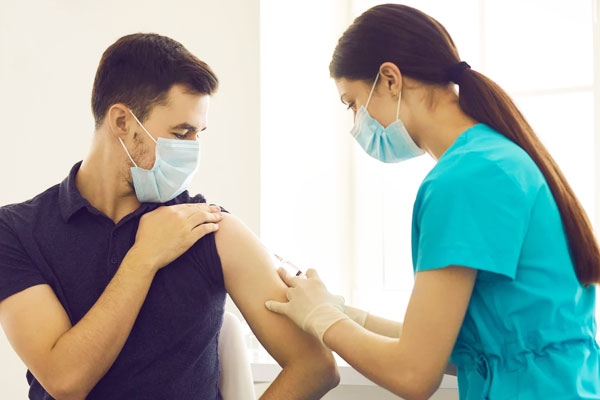
(Image source from: Canva.com)
Six years after the onset of Covid-19 on a global scale, there has been a noticeable increase in infections in various regions of Asia, including India, as well as in the United States. While the majority of cases reported in healthcare settings are mild, medical professionals emphasize that adhering to basic hygiene practices is crucial, particularly as India is currently recording 1,010 active cases. The prevalent virus variants in the country include LF.7, XFG, and JN.1, along with a new Omicron sub-lineage, NB.1.8.1, which exhibit symptoms similar to those of the flu, such as coughing, a runny nose, throat discomfort, mild fever, headaches, body aches, and in some instances, gastrointestinal problems.
Similar to other respiratory illnesses, SARS-CoV-2 is also experiencing seasonal upticks attributed to mutations, yet the vaccines accessible in India do not specifically target these strains. Nevertheless, experts suggest that individuals who have previously contracted Covid-19 or those who received recent vaccinations are likely to retain some level of immunity against severe illness if they encounter a similar variant of the virus again. A recent study indicates that prior vaccination against Covid-19 continues to provide significant immune defense, even against newer variants like Delta and Omicron, although it may slightly hinder the immune system’s capacity to produce new, mutation-targeted antibodies.
Researchers from the University of Arizona Health Sciences reported their findings in Nature Immunology, stating that vaccinated individuals demonstrate a considerably stronger immune response to changing SARS-CoV-2 variants in comparison to those who have never been vaccinated. The primary focus of the study was to explore how the immune system adjusts when exposed to a virus that subsequently mutates. Deepta Bhattacharya, the senior author of the study and executive director at the university’s Centre for Advanced Molecular and Immunological Therapies, noted, "Are you able to generate new responses against those new mutations? The answer is yes, with some nuances."
The research analyzed the immune reactions in individuals who had been infected with the Delta or Omicron variants, comparing those who had received a vaccine targeting the original strain to those who had not been vaccinated. The findings revealed that vaccinated individuals produced more antibodies following an infection than their unvaccinated counterparts. However, among the vaccinated group, the production of antibodies specifically targeting the new mutations was somewhat reduced. Bhattacharya commented, "If you were vaccinated against the original strain and subsequently contracted the Delta variant, you generated a considerable amount of protective antibody responses overall."
Conversely, vaccinated individuals exhibited a decreased number of antibodies aimed at the mutated virus compared to those who became infected with the Delta variant without prior vaccination. This phenomenon, often referred to as "antigenic imprinting" or "original antigenic sin," is a recognized concept in immunology, where the immune system tends to prioritize familiar components of a virus, potentially at the cost of effectively responding to newer variants.
The authors of the study emphasized the significant advantages that prior vaccination continues to provide in terms of immune protection, noting that the decline in mutation-specific antibodies is not expected to severely impact an individual’s health. The researchers indicated that the findings could inform the future development of vaccines. The research revealed that those exposed to the Delta or Omicron variants were less capable of generating antibodies for newer mutations compared to their responses to the original virus strain. This remarkable observation may influence the design of next-generation vaccines.
“One of the key points from this study is the potential to engineer vaccines that more effectively direct immune responses. By identifying the viral components that evade immune recognition, we could create vaccines that target those areas more reliably,” stated Bhattacharya. The primary message from this research is that vaccination continues to be the strongest safeguard against Covid-19, even amidst ongoing viral mutations.
“Although there may be a slight drop in immune specificity, individuals who have been vaccinated still enjoy significantly greater protection overall,” Bhattacharya noted. This study addresses a widespread concern that receiving a Covid-19 vaccine could diminish the body’s ability to combat newer variants. The findings indicate that this concern is unfounded; vaccinated individuals maintain solid overall immunity despite minor changes in the virus. Ongoing research will further explore how immune systems respond to various virus iterations and how to enhance the effectiveness of future vaccines.
As nations strategize long-term approaches to Covid vaccination, research like this remains crucial. For the time being, health professionals continue to advise individuals to keep their Covid vaccinations current, as they provide robust protection against severe illness, even as the virus evolves.







